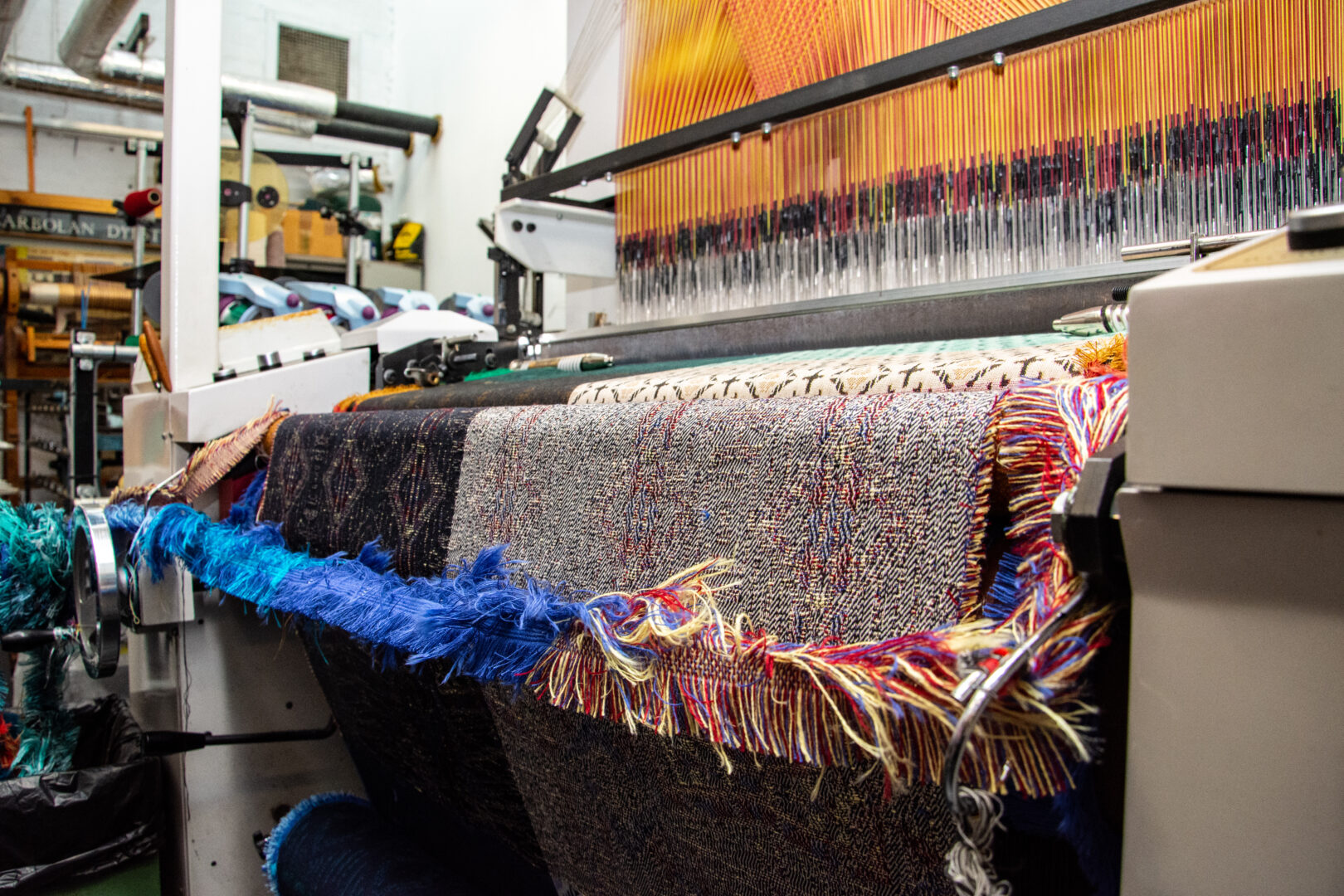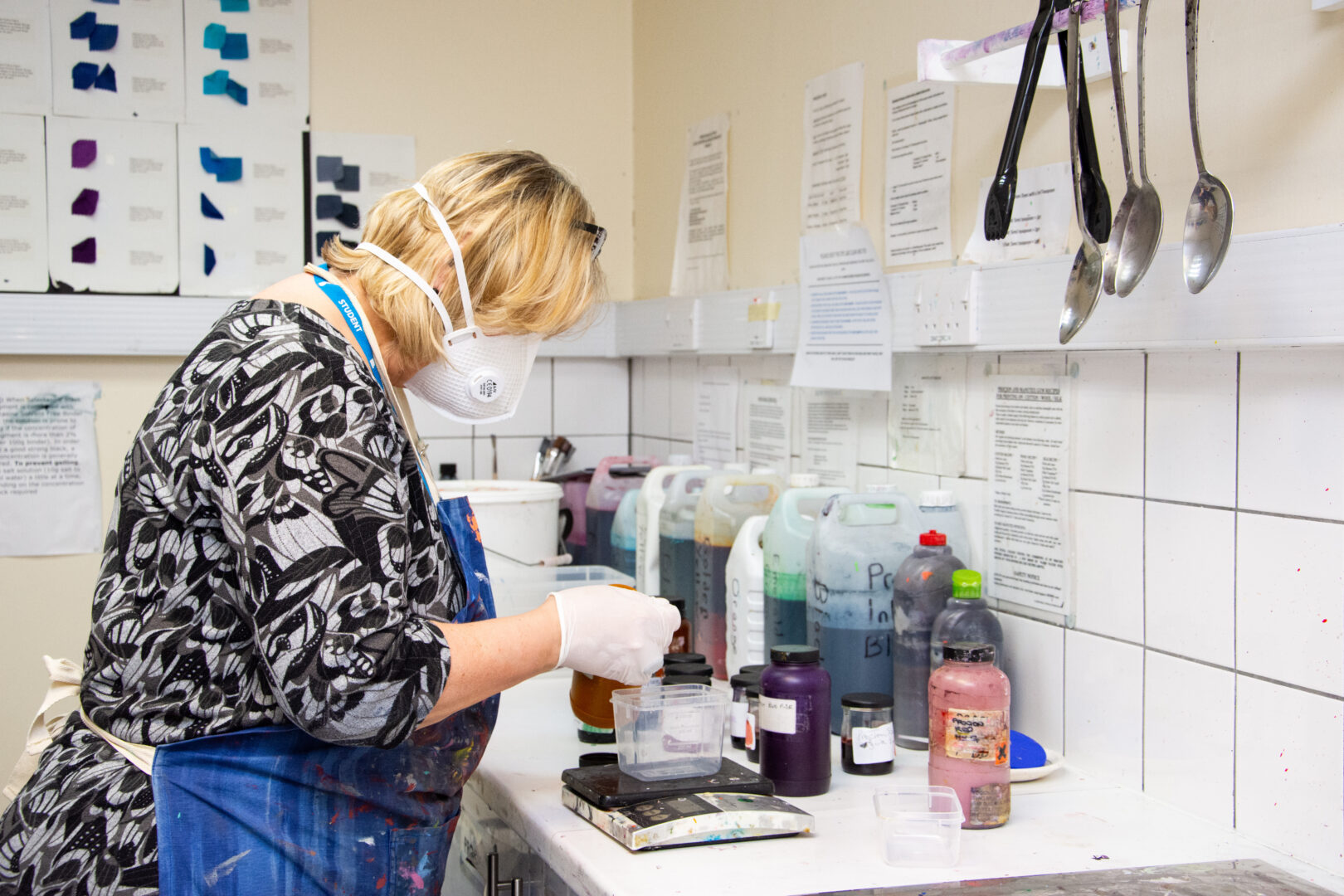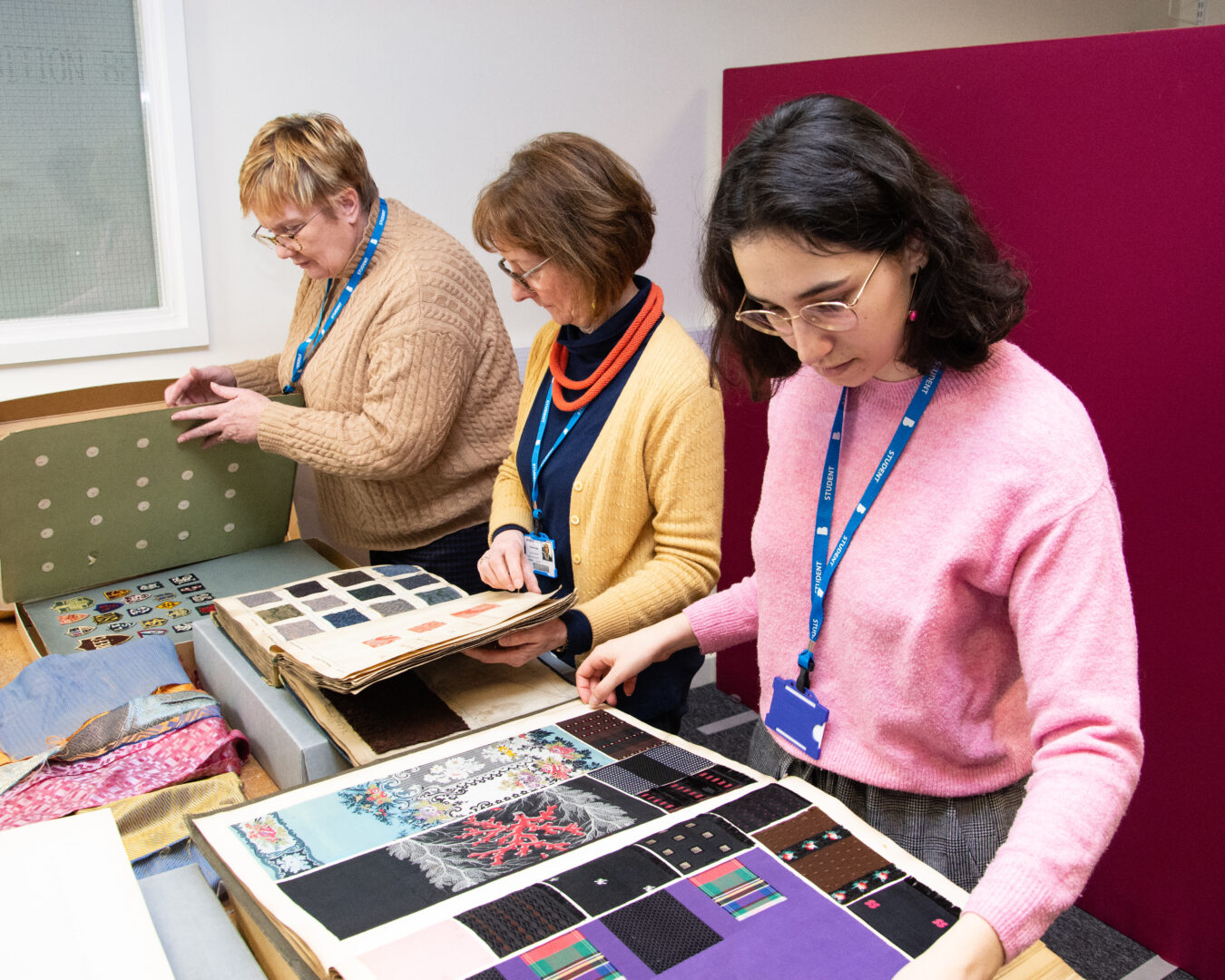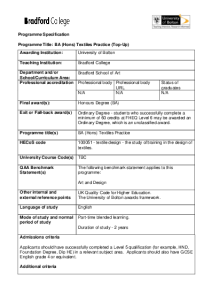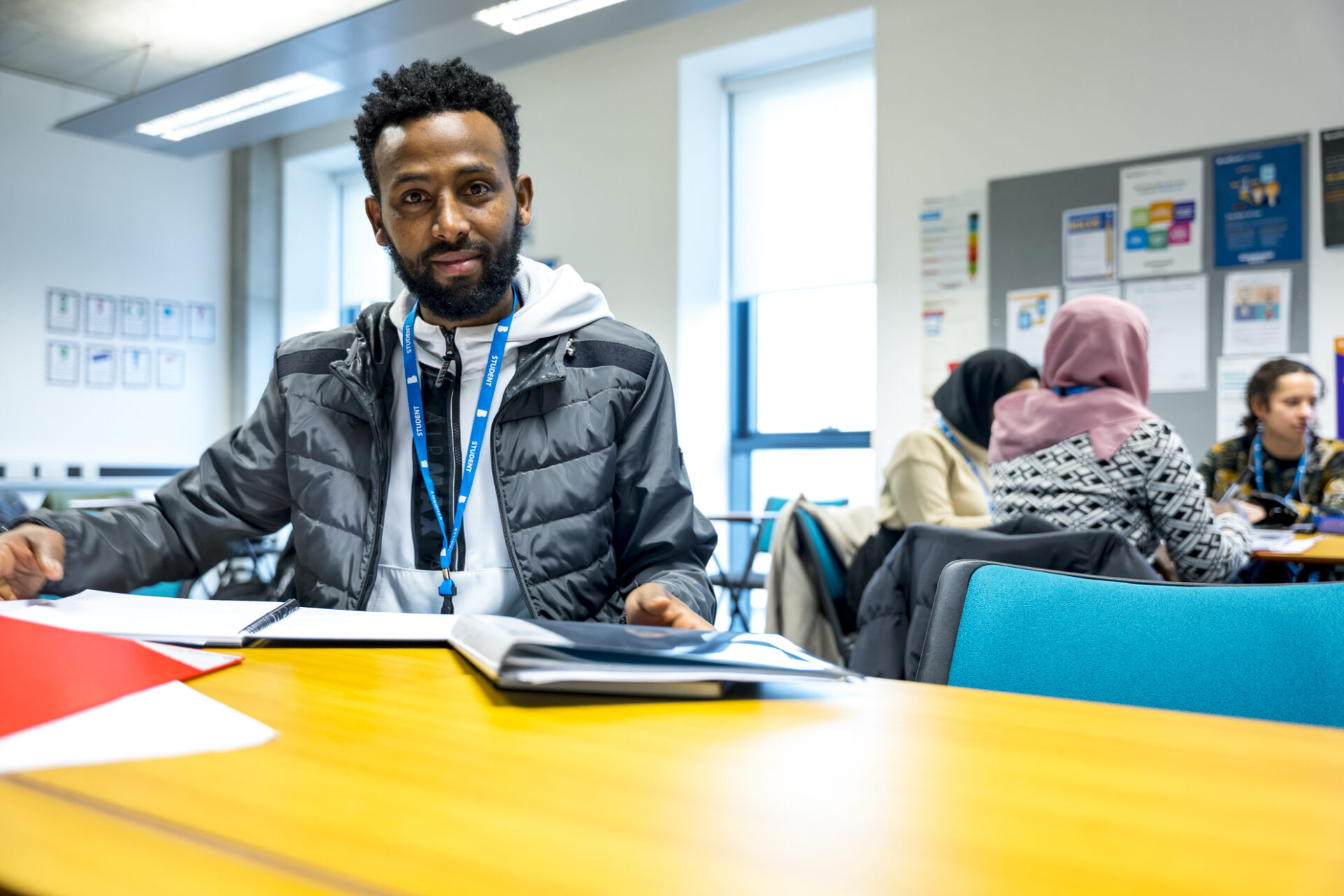BA (Hons) (Top-up) Textiles Practice
Qualification Gained: Bolton Institute BA (Hons) in Textiles Practice (Top-Up) - Bradford College
Study LevelLevel 6 Course TypeHigher Education Duration2 Academic Years Start DateSeptember 2025 Study ModePart-time LocationLister BuildingOverview
This programme will develop your practical skills and knowledge of textile materials and techniques, and how to research and apply these creatively to a professional standard. You will be supported to create a significant body of textile work, which pulls together your creative ideas, different materials, textile making and presentation methods to communicate your individual creative practice.
The programme provides a specialist level 6 progression route for students on FdA Textiles Practice, as well as those with other relevant level 5 qualifications wishing to complete an honours degree. The unique part-time, blended learning model allows students to balance study with other commitments, as well as the opportunity for learners from across the UK to study with us. Students have access to a dedicated textile print room, hand weaving looms, printmaking facilities – paper, letter press, etching, laser cutter, sewing machines, digital suites – mac and pcs for digital work, a yarn store where you can borrow yarns for your projects, an excellent library packed with journals and digital resources, electronic journals and textile books.
Visiting speakers and our tutors are all practising artists who will talk about their work, set project briefs and competitions. You will receive regular online tutorial support and be allowed to experiment with different colours, materials, fabrics in order to develop your talents.
Key Info
The programme comprises a blend of theoretical and practice-based learning, focussed on textiles in art, craft and design. Modules are delivered over two-years, part-time, 60 credits per year. Students will usually attend college for five long weekends per year, with online tutorial support between teaching blocks. At level 6, the emphasis is on identifying areas of specific interest in relation to individual textile practice. You will develop your critical thinking abilities in order to reflect on your creative practice, thinking about different audiences and contexts. By the end of the degree, you will have a strong academic and professional background in textile art and design practice, enhancing your chances of employability within textiles and wider creative industries, or to carry on with your studies at postgraduate level.
In year 1 students will be supported in choosing subjects to explore through in-depth critical research, creative investigation and textile exploration. Students may choose to work with traditional fibres, fabrics and processes, digital skills, unconventional materials or a combination of media and techniques. Alongside the textiles and research modules, students will also develop professional skills through practical and professional experiences.
In year 2 students will focus on a Major Project, which will be a self-identified area of textiles practice, culminating in a body of resolved textile outcomes. To enhance professional skills, students will also learn how to present and promote their work, with the programme culminating in a professional exhibition of work.
The course has been designed and written in a way that takes into account all previous artistic experience and mixed experience and skills.
Year 1:
- Individual Creative Research – an opportunity to research an area of personal interest to stimulate and inspire creative practice. Students will propose a theme or topic of interest, shaping this through discussion with the module tutor. This might include research into other artists, designers and makers, historical and global influences on textiles or broader topics relating to the arts. (20 credits)
- Professional Practice – as a new artist, it is to be expected that you will have a ‘portfolio career’ as a freelance artist, which may include teaching, workshop delivery, working to commission, and exhibiting. Here, you will be given the knowledge, skills and understanding to allow you to work professionally. You will learn about key professional networks and organisations, as well as how to apply for relevant opportunities. (20 credits)
- Textiles Investigation – this module allows you to carry out creative investigations of advanced or specialist textiles techniques; constructed textiles, mixed-media, embroidery or surface pattern. (20 credits)
Year 2:
- Major Project – An individual project that builds on all your knowledge, skills and abilities and aligns with your career and creative goals. You will develop a body of work which may include original artwork, sketchbooks, designs, sampling and materials investigation. (40 credits)
- Exhibition, Planning & Promotion – This module focuses on presenting your textile practice professionally to the wider world. You will be introduced to key aspects of professional knowledge, including intellectual property, exhibition design, portfolio presentation, costing and pricing; and learn how to apply this to your own work or practice. (20 credits)
Applicants should have successfully completed a Level 5 qualification (for example, HND, Foundation Degree, Dip HE) in a relevant subject area. GCSE English grade 4 or equivalent.
Additional criteria:
Non-standard applicants (those without the above qualifications) will be required to produce evidence of their ability to study at Higher Education Level 6. Short-course and relevant work experience may be considered.
Non-standard applicants will be interviewed with a portfolio of work and may be required to complete a piece of written work as part of their application.
Claims for Recognition of Prior Learning (RPL) are welcomed by the College. Students should consult the admissions tutor if they wish to claim such recognition.
Additional admissions matters:
Applicants will be invited to an interview and present a portfolio of practical work. This portfolio may consist of research, design development and work in progress (such as sketchbooks, visual journal) or finished pieces of work.
The nature of this programme actively encourages learners from non-traditional learning routes.
International students are additionally required to achieve an overall score of 6 (with each subset no lower than 6) in IELTS. Please consult the Admissions department for further details.
Assessment tasks are linked to the learning outcomes for each module and are completed by the end of the module. Assessments generally take the form of course work in the form of specific project briefs appropriate to each module, which may include some of the following:
- Research files
- Sketchbooks, drawing and visual journals
- Illustrated reports
- Textile sampling
- Finished products
- Verbal and visual presentations
- Exhibitions or portfolios
Formative assessment takes place throughout the course, during feedback at one-to-one tutorials and through peer review at group critiques. This feedback is aimed to support the learner’s development and does not contribute to a final grade. Written summative assessment will be provided by the module tutor after the module has been completed. Verbal feedback may also be offered during tutorials to provide clarification.
Throughout the programme there is an emphasis on professional skills and individual career goals. The Professional Practice module in year 1, supports students to plan and engage with specific professional experiences, such as delivering workshops or other practical teaching experiences.
The curriculum is enriched by external study visits, trips and visiting speakers. Students have access to industry-led talks and activities via our industry links with the Bradford Textile Society, and local art networks.
The staff team brings a wealth of professional experience to the programme, as practicing designers, makers and exhibiting textile artists. They are keen to bring those experiences into the curriculum to ensure the programme is applicable to current trends and professional practices, developing graduates who are ready for professional practice.
Graduates from our HE textiles programmes progress to further study including Masters study and PGCE. Graduates also develop creative careers as practising textile artists, freelance crafts practitioners and designers or work in the museums sector or in education. Many arts graduates will also develop portfolio careers that combine aspects of creative practice with teaching, community arts, freelance project work and commissions.
HE Tuition: £4,625.00 per academic year
Other Costs: Equipment £700 maximum (art materials, sketchbooks, display materials, printing and textile materials for project work), Trips and visits £250, Materials for final collection £300 maximum and Domestic sewing machine (optional cost).
This is representative of the most common fees scenario, but actual fees can vary depending on a number of factors. Please contact us if you need more guidance.
If you have any questions or require any additional information, please contact [email protected]
Disclaimer: Our prospectus, college documents and website are simply here to offer a guide. We accept no liability for any inaccurate statements and are not responsible for any negative outcomes if you rely on an inaccurate statement. We reserve the right to withdraw any programmes or service at any time.
